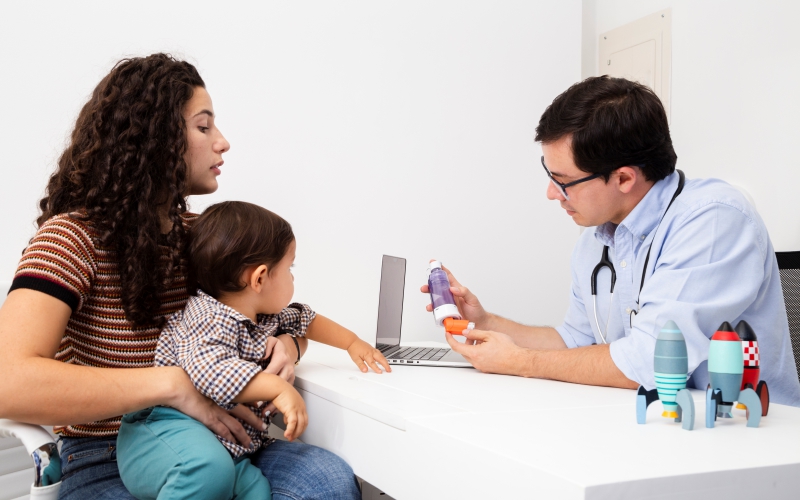Author:Dr. Neeraj Kumar, MBBS, DCH, MD
Consultant: Paediatrician at Motherhood Chaitanya Hospital, Chandigarh
Tips to Soothe Your Baby During Teething
Teething is an inevitable part of your baby’s development. It can, however, also be a difficult time for parents as their babies struggle through the process. According to Dr Neeraj Kumar, MBBS, DCH, MD, Consultant-Paediatrician, the babies usually show crankiness or drooling during this period. Although the process is normal you can try to soothe them in the comfort of your home. If, however, you notice anything abnormal, consult the best paediatrician in sector 44 at the earliest.
When Does Teething Start?
Usually, most babies begin teething between the ages of 5 and 8 months. Some babies, however, can also show teething earlier or later than this age. Hence, you must monitor their symptoms and visit the paediatrician if you suspect anything abnormal.
What are the Symptoms of Teething?
The teething of babies starts with two bottom front teeth followed by the two top front teeth.
The other symptoms associated with teething include:
- Irritability or fussiness.
- Chewing.
- Excessive drooling.
- Sore or tender gums.
- Slight increase in temperature, but no fever.
Usually, teething is not associated with fever. If your baby, however, has a rash, fever, or diarrhoea, consult the best paediatrician in sector 44.
Tips to Soothe Your Baby During Teething
Teething in babies can be handled at home with certain home remedies as follows:
1. Give them a Gum Massage
Your baby is probably getting cranky due to the irritated and sore gums. When you see your baby crying, try giving them a cooling gum massage with a teething ring. Make sure that you purchase good quality teething toys. The toys should be of solid plastic and store them in your refrigerator. After every use, check your teething toys properly to ensure that they are not broken as it can cause choking.
2. Give them a Cooling Treat
Another way to deal with sore gums is by cooling them. Take a clean washcloth, soak it in water, and keep it in the freezer for at least 30-60 minutes. Cool the affected area with this frozen washcloth.
3. Become Your Baby’s Favourite Chew Toy
Depending on whether this is your baby’s first tooth or not, you can let your baby gum at your fingers. Make sure, however, that your fingers are clean. To make it more helpful, you can dip your fingers in cool water to help them calm their gums.
4. Apply Some Pressure
Rubbing your fingers on your baby’s gums with a little pressure can give them relief from the pain. Make sure, however, that your fingers are clean and dry.
5. Wipe and Repeat
A lot of people consider drooling to be normal and hence they let their baby sit with a wet face. This leads to rashes. Although you cannot wipe them every time, they drool make sure that you wipe them clean most of the time to avoid rashes.
6. Maintain Their Regular Routine
In your baby’s life, teething is going to be temporary. Do not let it hinder your baby’s bedtime routine. Stick to the same routine as much as possible so that they can fall asleep at the same time every day.
7. Give Them Medicine
Medicines should always be a last resort for your baby. Do not, however, self-administer, visit the best paediatrician in sector 44 for consultation.
Teething is one of your baby’s milestones you might have a love- and hate- relationship. As your little one grows, you might find yourself looking for tips and tricks to deal with temporary situations. In such cases, it is best to have expert advice from Dr. Neeraj Kumar at the Motherhood Hospitals.
At Motherhood Hospitals, we have a team of experienced specialists backed by the latest infrastructure and facilities. We have the best PaediatricIan in Chandigarh.
Do take an appointment with the best Paediatrician in Chandigarh at a centre closest to you. Meet with our doctors who will carry out the required investigations, diagnose the issue and recommend the most appropriate treatment, enabling you to lead an active life.
If you wish to get in touch with Dr. Neeraj Kumar, please book your appointment here.


 Toll Free Number
Toll Free Number












 While flu is generally a mild illness in healthy children, certain groups face a higher risk of complications. These include:
While flu is generally a mild illness in healthy children, certain groups face a higher risk of complications. These include:



